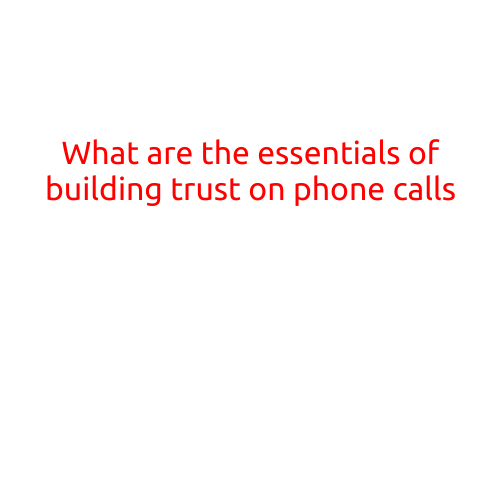
What are the Essentials of Building Trust on Phone Calls?
In today’s digital age, phone calls are an essential part of business communication. Whether you’re a sales representative, a customer service agent, or an entrepreneur, phone calls can make or break relationships with clients, customers, and partners. Building trust over the phone is crucial to establish a strong foundation for any business interaction. In this article, we’ll explore the essentials of building trust on phone calls and provide you with actionable tips to improve your communication skills.
1. Be Prepared and Prepared
Before making a phone call, make sure you’re prepared to talk to your counterpart. Research the person, their company, and their current needs. This will help you tailor your conversation to their specific concerns and show that you’re genuinely interested in helping them.
2. Establish a Positive Tone
The tone of your voice sets the stage for the entire conversation. Start with a friendly and professional tone, use a smile to establish a positive rapport, and speak clearly to ensure you’re easy to understand.
3. Be Transparent and Honest
Honesty is the best policy, especially when building trust. Be transparent about your intentions, goals, and any limitations. Avoid making false promises or exaggerating benefits. Instead, focus on what you can deliver and how you can help your counterpart.
4. Show Empathy and Understanding
Phone calls can be impersonal, but showing empathy and understanding can help bridge that gap. Listen actively to your counterpart’s concerns, ask clarifying questions, and acknowledge their feelings. This shows that you care about their well-being and are committed to finding a solution.
5. Follow Through on Commitments
Once you’ve made a commitment, whether it’s a promise to follow up or deliver a service, make sure you follow through. This demonstrates reliability and accountability, which are essential for building trust.
6. Use Positive Language
The words you choose can either build or break trust. Use positive language to focus on solutions rather than problems. Avoid using jargon or technical terms that might confuse your counterpart. Instead, simplify your language to ensure it’s easy to understand.
7. Show Your Personality
Phone calls can be stiff, but showing your personality can help build rapport and establish a connection. Be yourself, and don’t be afraid to share a personal anecdote or a relevant story.
8. Be Proactive and Responsive
Respond quickly to inquiries and concerns. Anticipate your counterpart’s needs and offer solutions proactively. This shows that you’re proactive and committed to finding a solution.
9. Show Appreciation and Gratitude
Express gratitude and appreciation for your counterpart’s time and business. A simple “thank you” or acknowledgement can go a long way in building trust and establishing a positive relationship.
10. Follow Up
After the phone call, send a follow-up email or thank-you note to reiterate your commitment to your counterpart. This shows that you’re invested in the relationship and willing to go the extra mile to ensure its success.
Conclusion
Building trust on phone calls requires effort, preparation, and consistency. By following these essentials, you can establish a strong foundation for any business interaction and increase the likelihood of success. Remember to be prepared, establish a positive tone, and be transparent and honest. Show empathy and understanding, follow through on commitments, and use positive language to build rapport. By implementing these strategies, you’ll be well on your way to building trust on phone calls and driving business results.





